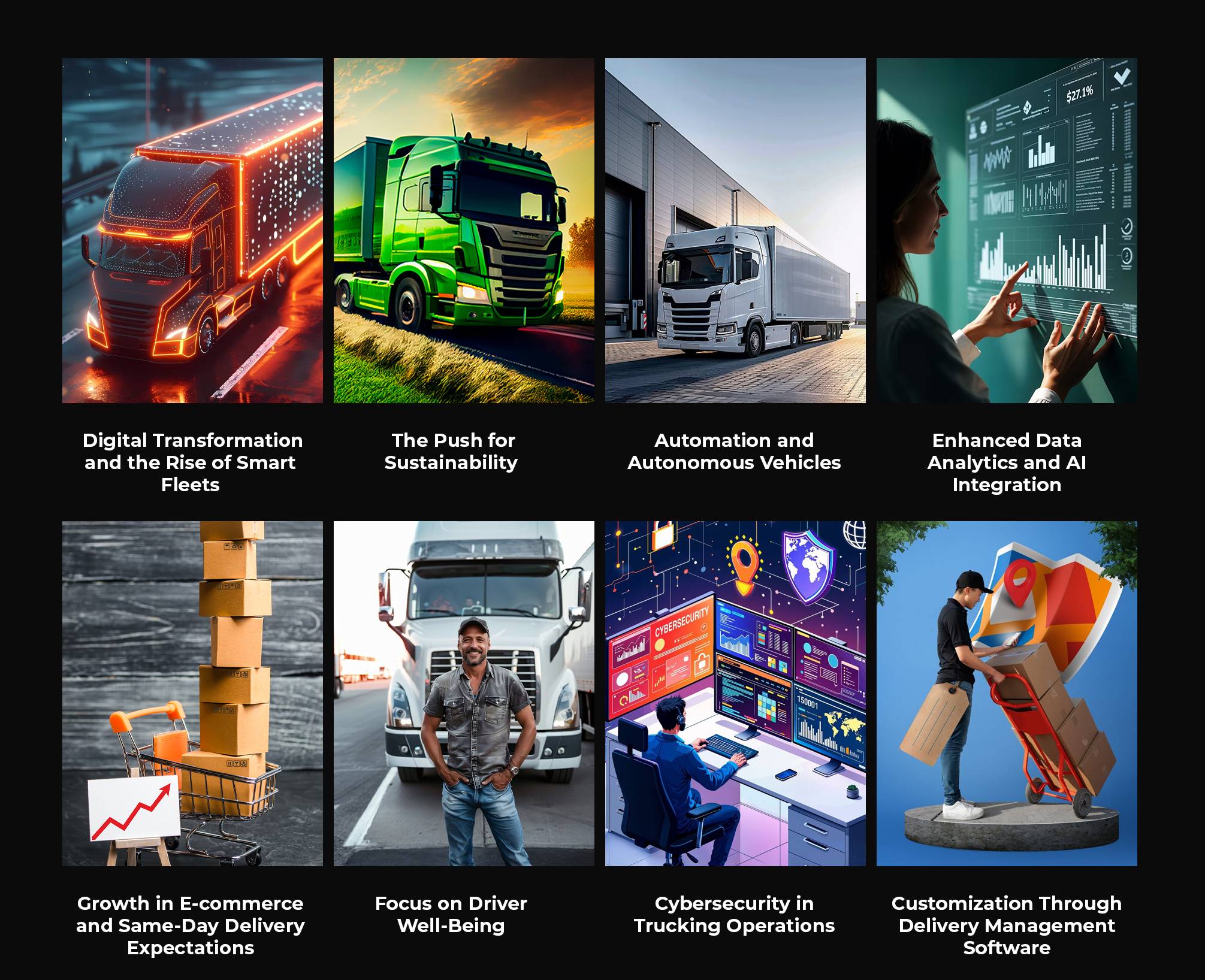
Key Trucking Industry Trends to Watch in 2025
The trucking industry is at the forefront of transformation as we approach 2025. It is driven by advancements in technology, shifting regulations, and evolving customer demands. For fleet operators, logistics professionals, and businesses relying on transportation services, staying ahead of these trends is crucial. Among the pivotal innovations reshaping the sector is the increased adoption of delivery management software, which enhances efficiency and reduces operational costs. Let’s explore the key trends expected to dominate the trucking landscape in 2025 and how they intersect with logistics technologies.
Trends To Look Out For

1. Digital Transformation and the Rise of Smart Fleets:
The digitalization of trucking operations is accelerating. Tools like fleet management software are empowering companies to monitor and manage their vehicles in real-time. Features such as route optimization, fuel usage tracking and predictive maintenance minimize costs and enhance service reliability.
By 2025, nearly 60% of trucking companies are expected to use IoT-enabled services in their fleets. Smart sensors and connected technologies will provide actionable insights, improving safety and compliance. Best delivery management software solutions will further integrate real-time tracking and automated updates, ensuring transparency in supply chains.
2. The Push for Sustainability:
Environmental concerns are reshaping the trucking industry, with stringent emission regulations and consumer pressure encouraging greener practices. The adoption of electric trucks and alternative fuels is increasing. The International Energy Agency (IEA) projects that by 2025, sales of electric heavy-duty trucks will triple, driven by technological advancements and government incentives.
3. Automation and Autonomous Vehicles:
Autonomous trucks are no longer just a futuristic concept. Companies like Tesla and Waymo are investing heavily in self-driving technologies. By 2025, semi-autonomous vehicles are expected to account for 10% of all new truck sales. This helps in combating driver shortages and reducing long-haul transportation costs.
Delivery operations will increasingly depend on integrated delivery management software. This ensures smooth handovers between humans and automated systems. This synergy will streamline scheduling, reduce delays and improve customer satisfaction.
4. Enhanced Data Analytics and AI integration:
Data analytics will play a crucial role in decision-making processes. Advanced AI- powered platforms can process massive volumes of data, predicting demand patterns, optimizing routes and ensuring timely deliveries. These capabilities are integral to best delivery management software, which offers advanced reporting features and AI-based recommendations for businesses.
For trucking companies, leveraging AI will enhance everything from fleet utilization to driver performance tracking, fostering a culture of continuous improvement.
5. Growth in E-commerce and Same-Day Delivery Expectations:
The e-commerce boom shows no signs of slowing. With online shopping set to grow by 50% globally by 2025, trucking companies are under pressure to meet tighter delivery windows and offer same-day or even same-hour services.
This demand emphasizes the importance of delivery management software and logistics management software. These tools empower businesses to manage high volumes of orders, allocate resources effectively, and provide customers with accurate delivery timelines.
6. Focus on Driver Well-Being:
The trucking industry continues to grapple with driver shortages, with projections estimating a downfall of over 100,000 drivers by 2025 in the U.S alone. To attract and retain talent, companies are prioritizing driver well being through better compensation, flexible schedules and access to health resources.
Technology, including fleet management software, can alleviate driver stress by providing safer routes, reducing paperwork through automation and offer real-time support. A happier workforce translates to better performance and reduced turnover.
7. Cybersecurity in Trucking Operations:
As the industry embraces digital solution, the risk of cyberattacks grows. In 2025, cybersecurity will become a key focus for trucking companies due to the widespread adoption of logistics management software. The increasing use of IoT-enabled vehicles will further heighten the need for robust security measures. Protecting sensitive data, such as delivery schedules and payment details, is crucial for maintaining trust and avoiding costly breaches.
Implementing robust security measures and training employees on best practices will be essential to safeguarding operations.
8. Customization Through Delivery Management Software:
In 2025, businesses will increasingly rely on best delivery management software to customize and streamline their operations. These platforms provide solutions tailored to specific industries, enabling optimized deliveries for sectors like healthcare, retail and food services.
With features such as multi-stop route planning, real-time updates, and performance analytics, these tools will set businesses apart by offering superior customer experiences.
Conclusion
As the trucking industry navigates the challenges and opportunities of 2025, embracing technology will be key. The integration of delivery management, fleet management, and logistics management software will help companies improve efficiency. This technology will also enable them to meet customer expectations and remain competitive.
Whether it’s through adopting autonomous vehicles, prioritizing sustainability, or leveraging AI for smarter operations, the trucking industry is poised for significant advancements. By staying ahead of these trends, businesses can ensure resilience and growth in a rapidly evolving landscape. Click on the red button below and book a demo with LogiNext today.
53







@LogiNext